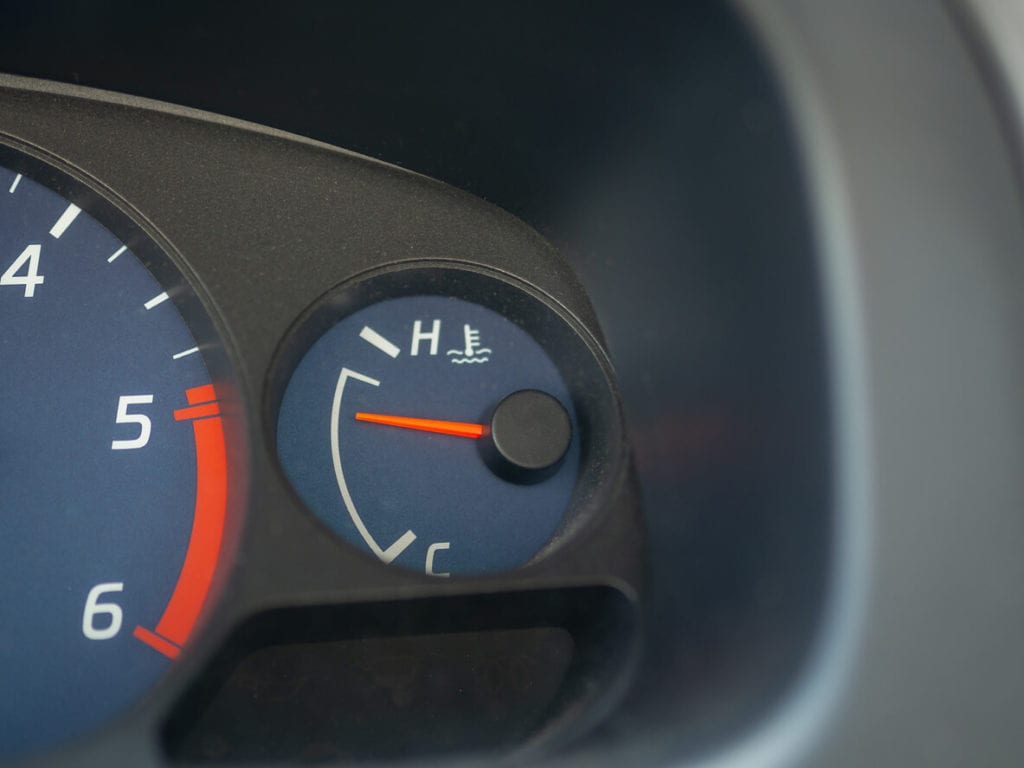Summer is in full force and it is HOT! Summer should be filled with family vacations, cooling off by the pool, and backyard barbecues. Instead, you’re on the side of  the road with an engine hotter than Hades and your frustration is no doubt climbing like the temperature. Engines overheat for several reasons, but in the summer, it’s really no surprise when you consider what your poor engine endures. The ambient temperature surrounding the engine, heat rising from the asphalt, heat generated from the engine, and the actual temperature all contribute to the temperature of your engine. Still, even on days where the weather is beautiful, your engine has the potential to overheat. Find out what causes engine overheating and what the symptoms of an overheated engine are.
the road with an engine hotter than Hades and your frustration is no doubt climbing like the temperature. Engines overheat for several reasons, but in the summer, it’s really no surprise when you consider what your poor engine endures. The ambient temperature surrounding the engine, heat rising from the asphalt, heat generated from the engine, and the actual temperature all contribute to the temperature of your engine. Still, even on days where the weather is beautiful, your engine has the potential to overheat. Find out what causes engine overheating and what the symptoms of an overheated engine are.
Why Is My Engine Overheating?
Many things can contribute to the cause of an engine overheating. The most likely cause, though, is the one thing that is necessary in keeping your engine cool and that is coolant. It’s possible your coolant level is low, as a result of a leak; an engine coolant leak reduces the level of coolant in the system, affecting the engine’s ability to be cooled. A leak may not be your only concern, however. Here are some other reasons your engine is getting all hot and bothered:
- Water Pump – A failed water pump prevents the coolant from circulating through the engine and thus, unable to cool the engine properly. The pump is a common place for leaks and can be difficult to detect, some pumps leak only when the engine is running.
- Blocked Radiator – A blocked radiator impedes the flow of coolant. If coolant is unable to travel through the radiator, the heat cannot be diffused into the air as intended.
- Head Gasket Blown – Head gaskets typically blow as a result of an already overheated engine. Still, once the damage is done, it can cause the coolant to leak out and draw in air, causing an immediate surge in temperature.
- Clogged Heater Core – The heat exchanger helps keep you warm in the winter. However, if it gets clogged, coolant is restricted from flowing.
Finally, a failed thermostat could be the reason for your cooling woes. Thermostats in a car differ greatly in comparison to the thermostat in your home. A home thermostat monitors the temperature and triggers the system to either heat or cool, depending on the setting. Your engine thermostat, however, is actually a valve that controls the coolant. Car thermostats regulate the temperature of the engine and gives the coolant the queue to flow or stay put based on engine temperature. A thermostat stuck in the closed position restricts the flow of coolant, thus preventing it from cooling the engine. A faulty thermostat can cause the engine to heat up and allow the temperature to continue to rise. No matter how hot the engine gets, the coolant is unable to reach the areas of the engine needed to cool, greatly increasing the temperature and the likelihood of overheating, rather quickly. You can determine that the thermostat is at fault when you observe that your engine is overheating yet the coolant level is full. Since the coolant has nowhere to go, it stays in the reservoir ready for its queue. The pressure and heat in the engine will grow and eventually expel coolant.
Engine Overheating Symptoms
If you notice steam escaping from your engine, coolant is past the boiling point, and is beginning to overheat. Pull over to the side of the road, safely, and turn off the engine. Preventing an engine overheat is imperative. An overheated engine causes the pistons to expand and seize up inside the cylinder, rupturing cylinder heads, and cracking the engine block, which leads to costly repairs or even entire engine replacement. Look, listen, and even smell what your car is communicating to you, to prevent overheating with these symptoms:
- Temperature Gauge in the Red Zone – The needle usually hovers somewhere in the middle between ‘L’ and ‘H’. The higher it gets, the hotter the engine.
- Thumping or Ticking Sound – A failed thermostat prevents coolant from flowing and instead causes it to heat up inside the engine block, producing a thumping sound as it mixes with the cold coolant from the radiator. Ticking sounds are the result of oil becoming heated and thinning, losing its ability to lubricate moving parts.
- Coolant on the Ground – Finding coolant on the ground could indicate a leak or the engine has run hot, causing the coolant to boil inside the system and into the overflow tank. This is troublesome because once the coolant overflow tank gets full, coolant will begin coming out of the overflow hose.
Weak Engine – An expanding piston will slow the crank shaft rotation. If you observe that your vehicle is losing power and no longer able to keep a reasonable pace, check your temperature gauge and observe whether the car is omitting a weird smell, which could indicate a coolant leak within the engine.
